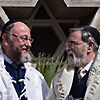
5 February 2014. The team found that memory rewrites the past with current information, updating recollections with new experiences. This form of editing happens in the hippocampus, working as the memory’s version of a film editor or special effects team.
5 February 2014. The brain edits memories relentlessly, updating the past with new information. Scientists say that this isn't a question of having a bad memory. Instead, they think the brain updates memories to make them more relevant and useful now — even if they're not a true representation of the past.
13 September 2014There can be no doubting the importance of recalling the crimes of the past. But there are dangers, too, in the region’s intellectual fashion for “historical memory”. Memory is by its nature subjective and selective.
14 September 2014. With survivors dying in growing numbers and their live testimonies soon to be a thing of the past, Holocaust commemoration efforts are increasingly focused around preserving the belongings that contain their stories.
25 September 2014. Tens of thousands of brass stones, five pounds apiece, are scattered across Europe. Called Stolpersteine, or “stumbling stones” in German, each one has a name, a year, and the fate of one of the people who disappeared during the Nazi era etched into its shining surface.Are Jews losing their story? (Jewish Journal)
15 September 2014. The story of Diaspora Jewry is history with a family name — it’s a history we can feel and touch and own in a personal way. For too many Jews, though, it’s also a history full of mystery.Lithuanian shtetl horror painful memory (Cleveland Jewish News)
26 September 2014. The chance finding of a hand-drawn map of my father’s shtetl, Pasval, Lithuania, circa 1926 identifying the Utian ancestral home triggered me, my cousin Gordon, his two sons, and my son, Brett, to explore family roots.The Interpretation of Suffering: Post Holocaust German and Jews (Jewish Currents)
19 September 2014. “We cannot become humane until we understand our need to visit suffering and death on others,” social philosopher Hugh D. Duncan observed — but Germans were not propelled to do that until the 1960s and 1970s, when a post-Third Reich raised generation was ready to unearth what the one of their mothers and fathers had embraced and unleashed.Out of the Vilna Ghetto: Dust -- and Determination (Huffington Post)
17 September 2014. Wearing masks and blue jeans, the volunteers, who are members of a group called Vardai ("names" in Lithuanian), aimed not only to haul away dust and debris but to advance a larger mission: "to commemorate Holocaust victims and help revive our collective memory."Italy's 'Little Jerusalem' Opens The Doors To Jewish History (Alabama Public Radio)
14 September 2014. Outside of Israel, Italy is believed to have the oldest continuing Jewish presence of any country – more than 2,000 years — with catacombs and a synagogue from ancient Rome, as well as synagogues from the Middle Ages, to the Baroque period and the 20th century.Hunted 60 years ago, Sonia is running again (Chicago Tribune)
5 September 2014. After spending decades coping with frightening memories, many late-onset patients finally begin losing the war against their pasts. Catastrophic events that they experienced long ago reinsert themselves into their lives, the strands of the past and the present becoming inextricably bound, with medicine virtually incapable of unraveling them.
United States
53.092603, 101.425781